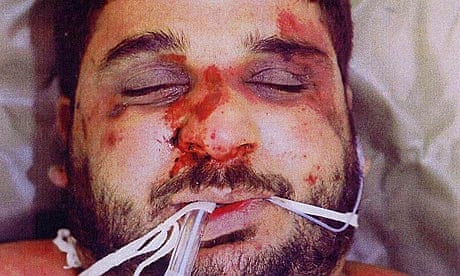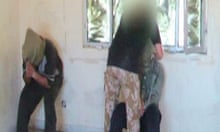15 September 2003: Baha Mousa, a 26-year-old hotel receptionist in Basra, is beaten to death while being held by British soldiers on suspicion of being an insurgent. He sustains 93 separate injuries.
6 January 2004: The Ministry of Defence (MoD) discloses it has paid compensation to Mousa's family without accepting any liability for his death.
10 May 2004: Amid reports of several cases of abuse by British soldiers against Iraqi civilians, Geoff Hoon, the then defence secretary, says a decision is pending on whether to take action against any soldiers involved in Mousa's death.
28 July 2004: Mousa's family mounts a high court challenge to the government's decision not to hold an independent inquiry. The court is asked to rule on whether the Human Rights Act 1998 applies to British troops in Iraq.
14 December 2004: The high court rules in favour of a full inquiry, saying Mousa's death in British custody in Iraq falls within the European convention on human rights. Previous MoD investigations are deemed inadequate.
25 February 2005: General Michael Jackson orders an internal army review of all alleged cases of abuse against Iraqi civilians.
19 July 2005: Seven British soldiers from the Queen's Lancashire Regiment are charged in connection with Mousa's death and abuse of Iraqi prisoners. Brigadier Geoffrey Sheldon calls it an "isolated, tragic incident" that every member of the regiment "bitterly regrets". Hoon's successor as defence secretary, John Reid, says it is vital that "justice is allowed to take its course".
21 December 2005: The court of appeal rules that an "independent and effective" inquiry must be held into how Mousa died, upholding the earlier high court decision. The MoD takes the case to the House of Lords.
19 September 2006: Corporal Donald Payne, 35, pleads guilty to inhumane treatment of Mousa, becoming the first British soldier to admit to a war crime, as the court martial of the seven soldiers charged over Mousa's death begins. Payne denies charges of manslaughter and perverting the course of justice. The six others, including commanding officer Colonel Jorge Mendonca MBE, plead not guilty to their charges.
14 February 2007: All charges are dropped against four of the seven soldiers. Mendonca, the highest-ranking British serviceman ever to face a court martial, is among those cleared.
13 March 2007: The six-month court martial ends with the acquittal of the remaining soldiers. Senior army officers and defence lawyers criticise the proceedings. Colonel David Black of the Queen's Lancashire Regiment says soldiers need to operate without being worried about "over-zealous and remote officialdom". Phil Shiner, who represented the Iraqis at the court martial, says the outcome is a "travesty".
16 April 2007: Lawyers acting for the family release pictures of Mousa's fatally injured body.
30 April 2007: Payne is jailed for a year and dismissed from the army. He is cleared of manslaughter because it cannot be proved he inflicted the fatal injuries.
6 June 2007: Mousa's family begins a civil case against the MoD.
13 June 2007: The law lords uphold the ruling that UK human rights laws did apply to Mousa while in British custody in Iraq, paving the way for a public inquiry.
25 January 2008: The army report ordered by Jackson in 2005 is made public. It says that while changes are needed to rectify serious flaws in the way soldiers are trained to deal with Iraqi prisoners, there is no evidence of systemic abuse.
27 March 2008: The MoD admits breaching Mousa's human rights and those of eight other Iraqi men.
14 May 2008: The MoD announces an inquiry into Mousa's death.
10 July 2008: The MoD agrees to pay almost £3m to Mousa's family.
15 October 2008: The public inquiry chairman, Sir William Gage, makes an opening statement in which he reveals that the soldiers have been granted immunity from prosecution based on their evidence to the hearings.
20 November 2008: Gage said he intended to question every soldier who witnessed the incident, whether or not they were directly responsible.
13 July 2009: The public inquiry gets under way. It is shown a shocking video of Payne screaming abuse at hooded and handcuffed detainees, and manhandling them as they are forced to maintain painful stress positions with their knees bent.
16 November 2009: Payne tells the inquiry Mendonca was "trigger happy" in Iraq and claims he witnessed another Army officer pretending to set one of the prisoners on fire.
15 February 2010 Giving evidence to the inquiry, Mendonca accepts responsibility for Mousa's death but says the tragedy was a "one-off" and insists he left Basra a better place.
2 June 2010 Adam Ingram, the former armed forces minister, admits he was "not accurate" when he told an MP in June 2004 that Iraqi detainees were not hooded as an interrogation technique.
7 June 2010 General Sir Mike Jackson, a former head of the Army, tells the inquiry Mousa's death remains "a stain on the character of the British Army" and stresses that a commanding officer is responsible for what his men do.
8 September 2011 Public inquiry chairman Sir William Gage publishes his final report.





